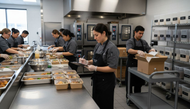
Complete Guide to Bulk Catering in Canada
Most American businesses serving large groups face a unique set of challenges when it comes to efficient meal preparation and delivery. Bulk catering stands out as a proven solution, allowing organizations to serve meals to more than 25 people at once while maintaining consistency and food safety. With the right approach, bulk catering transforms complicated logistics into streamlined processes, helping restaurants, corporate cafeterias, and institutions deliver quality meals that satisfy every guest and stretch every budget.
Table of Contents
- Defining Bulk Catering And Key Concepts
- Main Types Of Bulk Catering Services
- How Bulk Catering Works In Practice
- Requirements, Safety, And Compliance In Canada
- Cost Structures, Benefits, And Common Pitfalls
- Key Takeaways
Key Takeaways
| Point | Details |
|---|---|
| Understanding Bulk Catering | It is a specialized food service for efficiently preparing meals for large groups, segmented into commercial and social catering sectors. |
| Types of Bulk Catering Services | Key categories include corporate, wedding, institutional, mobile, and specialized cuisine catering, each catering to specific needs. |
| Operational Logistics | Successful bulk catering relies on meticulous planning, meal preparation techniques, and adherence to food safety regulations. |
| Cost Considerations | Effective management of food packaging and inventory costs is crucial for profitability in bulk catering operations. |
Defining Bulk Catering and Key Concepts
Bulk catering is a specialized food service strategy designed to prepare and serve meals for large groups efficiently and economically. According to cbseacademic.nic.in, bulk food production involves preparing food for more than 25 people, categorized into two primary segments: commercial catering (restaurants, hotels) and social catering (school canteens, hospital services).
At its core, bulk catering encompasses systematic food preparation techniques that enable businesses and institutions to feed substantial numbers of people simultaneously. Collins Dictionary defines this as the trade of supplying food and drink to large customer groups, typically in institutional environments. This approach requires specialized planning, equipment, and logistical considerations to maintain food quality, safety, and cost-effectiveness.
Key characteristics of successful bulk catering include:
- Scalable food preparation methods
- Consistent portion control
- Advanced inventory management
- Strategic menu planning
- Efficient storage and transportation solutions
For businesses and organizations in Canada seeking to optimize their food service operations, understanding bulk catering principles becomes crucial. Whether you're managing a hotel restaurant, corporate cafeteria, or event catering service, mastering these concepts can dramatically improve operational efficiency and customer satisfaction. Learn more about strategic bulk purchasing in our guide on bulk food items for restaurants.
Main Types of Bulk Catering Services
Bulk catering services encompass a diverse range of food service solutions designed to meet the unique needs of various organizations and events. City Food Equipment highlights mobile catering as a dynamic segment that utilizes food trucks and pop-up stands to deliver fresh, made-to-order meals with remarkable flexibility in location and menu variety.
The bulk catering landscape includes several specialized service types tailored to different contexts and client requirements. Event catering remains the most versatile category, supporting everything from corporate conferences to wedding receptions. Distinctive Catering emphasizes the popularity of barbecue catering for outdoor gatherings like family reunions, which offers an engaging on-site grilling experience that creates a relaxed, interactive atmosphere.
Key types of bulk catering services include:
- Corporate Event Catering: Professional meals for business conferences and meetings
- Wedding and Social Event Catering: Large-scale food service for celebration venues
- Institutional Catering: Meal services for schools, hospitals, and government facilities
- Mobile and Food Truck Catering: Flexible, location-independent food services
- Specialized Cuisine Catering: Themed or specific dietary requirement services
For businesses looking to optimize their catering approach, understanding these service types is crucial. Selecting the right catering style can dramatically impact event success and guest satisfaction.
corporate event catering Interested in learning more about strategic food preparation? Check out our guide on bulk grocery meal prep for additional insights into efficient food service strategies.
How Bulk Catering Works in Practice
Nova Scotia Food Protection highlights a critical aspect of bulk catering: providing food service at a function location separate from the preparation site. This process demands meticulous planning, specialized equipment, and precise temperature control to ensure food safety and quality during transportation and service.
Operational logistics form the backbone of successful bulk catering. Caterers must navigate complex requirements including equipment selection, menu planning, transportation protocols, and strict food safety standards. Revenu Quebec notes that catering businesses are subject to specific regulatory classifications, particularly for events like banquets and weddings.
Key practical considerations in bulk catering include:
- Advanced meal preparation techniques
- Precise portion control and packaging
- Temperature-controlled transportation systems
- On-site service and setup protocols
- Compliance with local health and safety regulations
- Flexible menu adaptation for different event types
For catering professionals seeking to optimize their operational strategies, understanding these intricate details is paramount. Effective bulk catering requires a delicate balance between culinary expertise, logistical precision, and regulatory compliance.
Want to dive deeper into efficient food service preparation? Check out our guide on bulk grocery shopping strategies for additional insights into streamlining your catering operations.
Infographic comparing typical restaurant service and bulk catering operations in Canada.
Requirements, Safety, and Compliance in Canada
Nova Scotia Food Protection emphasizes the critical importance of food safety standards in Canadian bulk catering. Caterers must rigorously ensure proper food handling, maintain precise temperature controls during transportation and service, and implement comprehensive strategies to prevent potential foodborne illnesses.
Navigating the complex regulatory landscape is essential for catering businesses across Canada. Revenu Quebec highlights specific mandatory billing measures that classify catering services as restaurant establishments, requiring meticulous record-keeping and adherence to taxation protocols.
Key compliance requirements for Canadian catering businesses include:
- Obtaining necessary food handling certifications
- Implementing HACCP (Hazard Analysis Critical Control Point) protocols
- Maintaining proper equipment sanitation standards
- Following provincial health department guidelines
- Securing appropriate business licenses
- Maintaining accurate financial and service records
For catering professionals seeking to navigate these intricate regulatory requirements, understanding the nuanced compliance landscape is paramount. Success demands a comprehensive approach that balances culinary excellence with rigorous safety standards. Want to explore the operational essentials further? Check out our guide to foodservice supply for Canadian operators for additional insights into maintaining a compliant and efficient catering business.
Cost Structures, Benefits, and Common Pitfalls
Kimecopak reveals that wholesale catering packaging represents a significant cost consideration for catering businesses, with disposable containers ranging from $0.05 to $0.30 per unit. These expenses can escalate quickly, especially when opting for eco-friendly materials, which typically command a higher price point and substantially impact overall catering operational budgets.
City Food Equipment highlights the strategic advantages and challenges of mobile catering, a flexible service model particularly popular for corporate events and festivals. While this approach offers remarkable menu diversity and location adaptability, it simultaneously introduces complex logistical challenges that can potentially compromise food quality and operational efficiency.
Key financial and operational considerations include:
- Precise inventory and packaging cost management
- Balancing quality with cost-effectiveness
- Developing scalable pricing strategies
- Mitigating risks associated with flexible catering models
- Investing in efficient transportation and service infrastructure
- Managing temperature control and food preservation costs
Successful catering businesses must navigate these intricate financial landscapes with strategic planning and adaptable approaches. Understanding the nuanced cost structures can mean the difference between profitability and potential operational challenges. Interested in diving deeper into strategic food service planning? Explore our guide to bulk grocery shopping strategies for additional insights into optimizing your catering business economics.
Streamline Your Bulk Catering with Trusted Canadian Suppliers
Managing bulk catering in Canada poses real challenges like ensuring food safety, controlling costs, and maintaining operational efficiency for large events or institutional services. The need for reliable bulk groceries, quality packaging, and essential kitchen equipment is crucial to meet these demands without compromise. With terms like HACCP protocols and temperature-controlled transportation shaping the industry, finding the right partners can ease your daily operational pressures.
Take control of your catering logistics today by partnering with Canada’s premier source for bulk groceries and culinary essentials. At ChickenPieces.com, you have direct access to a wide selection of products designed for scalable food prep, cost-effective packaging solutions, and compliant foodservice supplies. Explore our detailed guides like the bulk grocery meal prep guide to boost your kitchen efficiency or learn how to avoid common pitfalls with our bulk grocery shopping strategies. Start optimizing your bulk catering operations now by visiting ChickenPieces.com and unlocking better value and quality for your foodservice needs.
Frequently Asked Questions
What is bulk catering and how does it work?
Bulk catering is a food service strategy designed to prepare and serve meals for large groups efficiently. It involves systematic food preparation techniques, planning, equipment, and logistical considerations to ensure food quality and safety during service.
What are the main types of bulk catering services?
The main types of bulk catering services include corporate event catering, wedding and social event catering, institutional catering, mobile and food truck catering, and specialized cuisine catering. Each type is tailored to meet specific client needs and event contexts.
What are the key safety and compliance requirements in bulk catering?
Key safety and compliance requirements in bulk catering include obtaining food handling certifications, implementing HACCP protocols, maintaining equipment sanitation standards, and following health department guidelines to prevent foodborne illnesses.
How can I manage costs effectively in bulk catering?
Effective cost management in bulk catering involves precise inventory and packaging cost management, balancing quality with cost-effectiveness, developing scalable pricing strategies, and investing in transportation and service infrastructure to ensure operational efficiency.

 US Dollar
US Dollar
